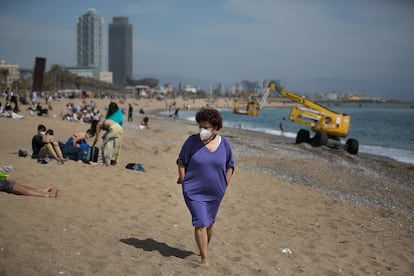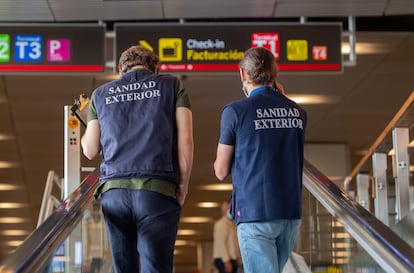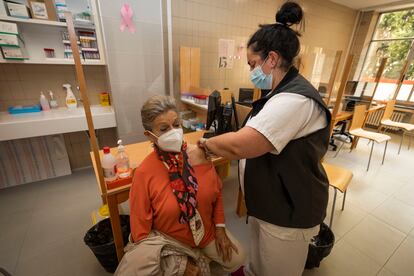Madrid extends mobility restrictions as coronavirus cases continue to rise
In Catalonia, meanwhile, the regional government has said that sunbathers do not have to wear a face mask despite the mandatory rules

The Madrid government has extended mobility restrictions to several areas in response to a rise in the coronavirus cases. As of Monday, another six basic healthcare zones – areas that are smaller than a district and include several primary healthcare centers – and three municipalities are under a perimetral lockdown, meaning residents can only enter and leave for essential reasons, such as to go to work.
The six zones are Las Margaritas, in the municipality of Getafe; San Fernando, in San Fernando de Henares; Villaviciosa de Odón, in the town of Villaviciosa de Odón; and in the city of Madrid: Alameda de Osuna (Barajas district), Rejas (San Blas-Canillejas district) and Chopera (Arganzuela district). The municipalities of La Cabrera, Moralzarzal and Colmenarejo have also been placed under a perimetral lockdown.
The mobility restrictions already in place in five basic healthcare zones and seven municipalities have also been extended until April 12. They are the zones of Valle de la Oliva, in the municipality of Majadahonda; and in the city of Madrid: Núñez Morgado (Chamartín district), Virgen de Begoña (Fuencarral-El Pardo district), Vicálvaro-Artilleros and Valdebernardo (both in the Vicálvaro district); and the municipalities of Navacerrada, Paracuellos de Jarama, Villanueva de la Cañada, Navas del Rey, Santos de la Humosa, Torrejón de Velasco and Chapinería.
This means a total of 11 basic healthcare zones and 10 municipalities are now under a perimetral lockdown, a measure that affects 324,000 residents or 4.9% of the population of the Madrid region. These areas account for 7.4% of all coronavirus cases recorded in the last 14 days.
The measure comes as the coronavirus incidence rate in Madrid continues to rise. According to the latest Health Ministry report, released Saturday, the 14-day cumulative number of cases in the region is above the 250-threshold considered to indicate a situation of extreme risk. Hospitals in Madrid are also under pressure, with Covid-19 patients occupying 35% of intensive care unit (ICU) beds, a figure that takes into account all possible spaces, including operating theaters. Indeed the most recent figures on the epidemiological situation in the region’s municipalities, released last Tuesday, showed that 91% of basic healthcare zones are at high or extreme risk, under the coronavirus alert system, which is based on indicators such as the 14-day and seven-day incidence rate, pressure on ICUs and hospitals, and the positivity rate, i.e. the percentage of tests that come back positive out of the total.
In addition to restrictions on mobility, the Madrid region will also maintain the measures aimed at curbing contagions over the Easter break until April 9. These include the perimetral lockdown of the region, the 11pm to 6am curfew, 11pm closing time for food and drink establishments and a ban on social gatherings between members of different households.
Castilla y León suspends indoor dining
The regional government of Castilla y León announced on Monday new restrictions on the hospitality industry in the cities of Valladolid, Burgos, Palencia, Segovia, Soria and 16 other municipalities where the 14-day cumulative number of cases per 100,000 inhabitants exceeds 150. In a bid to curb contagions, indoor dining will be suspended for two weeks from Tuesday.
The other municipalities affected by the restrictions are: Tudela de Duero (Valladolid); El Espinar and Riaza (Segovia); Briviesca, Miranda de Ebro and Medina de Pomar (Burgos); El Burgo de Osma (Soria); Aguilar de Campoo, Venta de Baños and Villamuriel de Cerrato (Palencia); Villablino and La Pola de Gordón (León); and Carbajosa de la Sagrada, Santa Marta de Tormes and Villamayor (Salamanca).
Growing research shows that the risk of coronavirus contagion is much greater in indoor spaces.
Sunbathers in Catalonia exempt from face mask rules

The Catalan regional government has said that beachgoers are only required to wear a face mask when socializing with other people. “When sunbathing, a face mask should not have to be worn. But when one gets up and interacts with someone, a safe distance must be maintained and a face mask worn,” said Miquel Samper, the acting chief of the interior department, in an interview on Saturday with Catalan radio station Rac1.
The statement was made in response to the controversy sparked by a new law that makes masks mandatory in all public spaces, even at the beach and swimming pools, regardless of the distance between people. The law, which was published last Tuesday in the Official State Gazette (BOE) last Tuesday, has sparked widespread backlash from the regions as well as the tourism industry, which argues the rules will hurt a sector already devastated by the coronavirus pandemic.
Shortly after the law’s publication in the BOE, the government admitted that the guidelines, which build on a decree passed in June of last year, may have been overtaken by today’s reality and improved knowledge about the coronavirus. The government and the regions have since agreed to set up an expert group that will be tasked with defining the exceptions to the rule and establishing how the new rules will be regulated.
Mandatory quarantine rules extended

The Spanish government has extended the 10-day mandatory quarantine for travelers coming from Brazil, Peru, Colombia, South Africa, Botswana, Kenya, Mozambique, Tanzania, Zambia, Zimbabwe, Ghana and Comoros until April 19.
Travelers coming to Spain from an airport in one of these nations, with or without an intermediate stopover, must self-isolate in the 10 days following their arrival, or for the entire duration of their trip, if staying for a shorter period. Aeronautical staff, however, are exempted from these rules.
The extension to the quarantine rules, published on Friday in the BOE, is aimed at curbing the spread of the coronavirus – in particular, the new, more-contagious variants of the virus first detected in South Africa and Brazil. The BOE states there is still concern about the variants, firstly because they are more contagious, present a risk of reinfection and may be more resistant to the current Covid-19 vaccines, and secondly “due to the spread to nearby countries [...] many of which have limited capacity for monitoring, detection and reporting.”
Spain administers more than 306,000 vaccine doses

Spain on Thursday administered more than 306,000 doses of the Covid-19 vaccine on Thursday, breaking a record for the number of shots given in one day. According to Health Minister Carolina Darias, the record was broken despite the fact that many regions – which are in charge of their own vaccination drives – did not publish their inoculation figures on Friday, given that Thursday was a public holiday in these areas. Since the vaccination campaign was launched at the end of December, 7% of the population has received the complete two doses needed for full protection.
The news came after the World Health Organization (WHO) criticized the slow pace of the vaccine drive in Europe. “Vaccines present our best way out of this pandemic. Not only do they work, they are also highly effective in preventing infection. However, the rollout of these vaccines is unacceptably slow,” said Han Kluge, the WHO’s regional director for Europe.
The European Union has missed its target of vaccinating 80% of the 80-and-over population and 80% of health workers by the end of March. Only 27% of the senior age group and less than half of health workers have been vaccinated. According to the European Center for Disease Prevention and Control (ECDC), only 5.7% of the population in the EU has received both shots of the Covid-19 vaccine, compared to 16% in the United States and nearly 20% in Chile.
More than 2,000 wait in line for vaccine due to misinformation
More than 2,000 members of mutual societies aged 80 and over lined up in the southern Spanish city of Seville on Thursday to receive a Covid-19 vaccine. Although they did not have an appointment, they were misled by a WhatsApp message advising “anyone over the age of 80″ who had not been vaccinated to go to a mass vaccination site set up in a sports facility of Seville University.
In response to the long lines, which saw up to 4,000 people at some moments, given that most of 80-and-overs were accompanied by family, the Andalusian Health Service (SAS) decided to boost the operation and vaccinate as many people as possible, even if they did not have an appointment.
“You have to be sensitive with these people who are elderly and have been tricked,” said a spokesperson from the Andalusian regional government.
With reporting by Margot Molina and Mónica Luengo Montero.
English version by Melissa Kitson.
Tu suscripción se está usando en otro dispositivo
¿Quieres añadir otro usuario a tu suscripción?
Si continúas leyendo en este dispositivo, no se podrá leer en el otro.
FlechaTu suscripción se está usando en otro dispositivo y solo puedes acceder a EL PAÍS desde un dispositivo a la vez.
Si quieres compartir tu cuenta, cambia tu suscripción a la modalidad Premium, así podrás añadir otro usuario. Cada uno accederá con su propia cuenta de email, lo que os permitirá personalizar vuestra experiencia en EL PAÍS.
¿Tienes una suscripción de empresa? Accede aquí para contratar más cuentas.
En el caso de no saber quién está usando tu cuenta, te recomendamos cambiar tu contraseña aquí.
Si decides continuar compartiendo tu cuenta, este mensaje se mostrará en tu dispositivo y en el de la otra persona que está usando tu cuenta de forma indefinida, afectando a tu experiencia de lectura. Puedes consultar aquí los términos y condiciones de la suscripción digital.








































